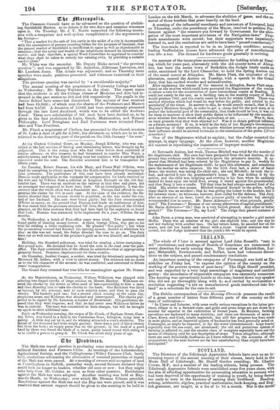IRELAND.
The whole of Ulster is aroused against Lord John Russell's "rate in aid" resolutions; and meetings of Boards of Guardians are summoned in every direction for early coming days. The unions of Enniskillen, Lur- gan, Maharafelt, Newtonwards, and Belfast, have had vehement discus- sions on the subject, and passed condemnatory resolutions.
An important meeting of the ratepayers of Fermanagh was held at En- niskillen on Friday last, " to express the opinion of the county on the working of the present system of poor-laws." The High Sheriff presided, and was supported by a very large assemblage of magistracy and untitled gentry: the attendance of respectable ratepayers was extremely numerous. The meeting was uproariously hostile to the rate; hooted down any speaker who did not go thoroughly along with it; and carried by acclamation resolution suggesting " a tax on manufactured goods introduced into Ire- land" as a substitute for the rate-in-aid.
The Dublin correspondent of the Morning Chronicle presents the result of a great number of letters from different parts of the country on the state of cultivation-
" In Ulster and Leinster, with some really serious exceptions in the latter pro- vince, tillage is in a forward state, and grain and green crops are put down in a manner far superior to the cultivation of former years. In Munster, farming operations are backward in many districts; and there are thousands of acres in Clare, Kerry, and Cork, totally neglected; but still fair progress has been made in most places, and an improved system of husbandry has been generally acted on Connaught, as might be expected, is far the worst circumstanced: large tracts' especially near the sea-coast, are abandoned; the old and pernicious system of farming is adhered to; and the smaller class of occupiers especially have not the means of obtaining seed for any description of crops. Taken altogether, although there are such formidable drawbacks as I have referred to, the accounts of the preparations for the next harvest are far less unsatisfactory than might have been anticipated."


























 Previous page
Previous page